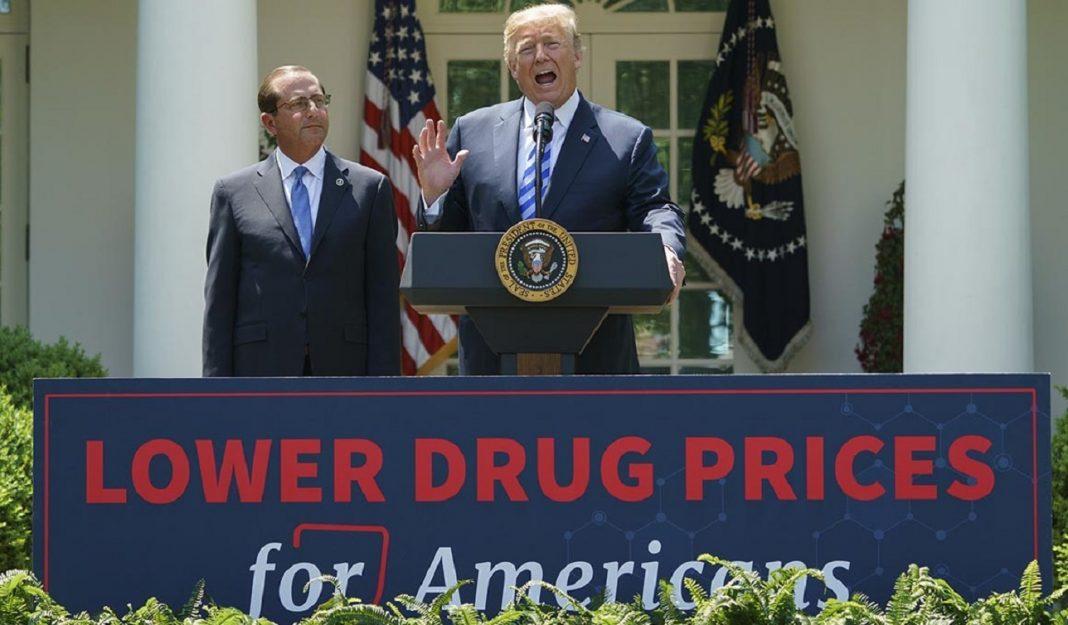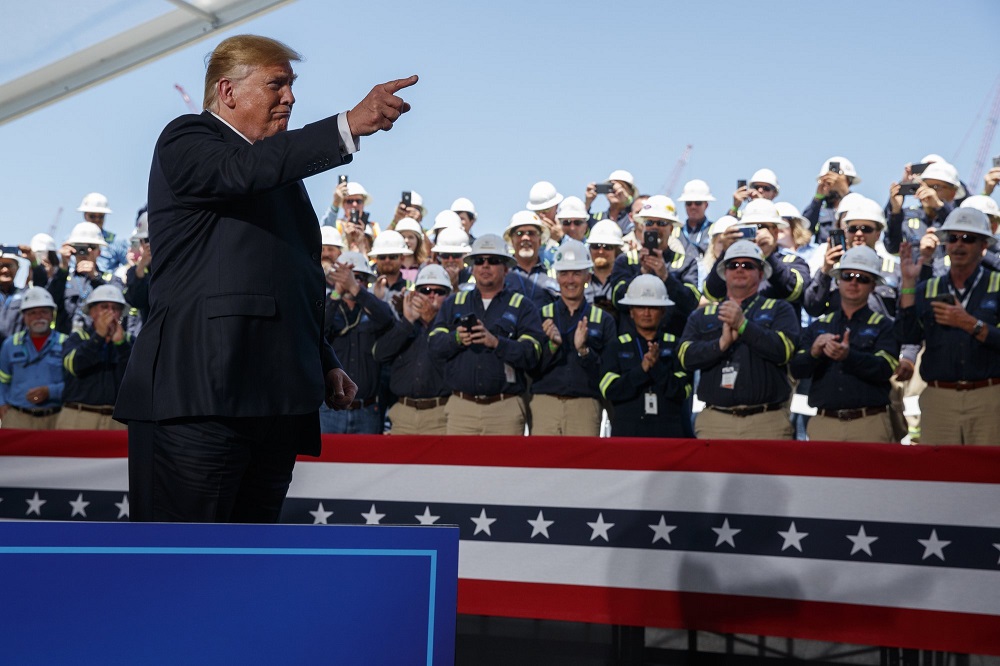
While Donald Trump is on the 2020 presidential election road, he’s making big promises and claims again. One of his bigger misstatements on Tuesday was regarding prescription drug prices.
Speaking Monday at a White House dinner, he cited a remarkable drop in prescription drug prices. But a government index that had registered some declines is now showing an increase again. Some experts say more increases are likely.
Digging deeper in the facts on Donald Trump’s claim:
TRUMP: “Drug prices have gone down for the first time in 51 years — they’ve gone down. First time in 51 years.”
THE FACTS: The president appeared to be referring to recent decreases in the Labor Department’s Consumer Price Index for prescription drugs, touted by the administration. But the CPI was updated Friday, before Trump’s latest claim, and it showed an increase of 0.3% in April for prescription drug prices, when compared with the same month last year.
The index tracks a set of medications, both brand drugs and generics.
Other independent studies point to increasing prices for brand name drugs as well and more overall spending on medications.
An analysis of brand-name drug prices by media outlets showed 2,712 price increases in the first half of January, compared with 3,327 increases during the same period last year. However, the size of this year’s increases was not as pronounced.
Both this year and last, the number of price cuts was minuscule. The information for the analysis was provided by the health data firm Elsevier.
An analysis by Altarum, a nonprofit research and consulting firm, found that in 2018, spending on prescription drugs was one of the main factors behind a 4.5% increase in U.S. health spending. Spending on prescription drugs grew much faster than in 2017, according to the study.
Economist Paul Hughes-Cromwick of Altarum, said he expects drug prices will continue to creep up.
“I would be quite surprised if by July the annual rate doesn’t return to a more normal 2%-4% growth,” said Hughes-Cromwick.
Hughes-Cromwick said the government’s inflation index can bounce around from month to month. If White House economic advisers “want to live by favorable months,” he said, “they’d better be ready to die by the less favorable ones.”
The government estimates the nation’s health care tab hit $3.6 trillion last year, or about 18% of the economy.
Donald Trump’s Oprah Style I-10 Promise To Louisiana
It was an Oprah-worthy moment: President Donald Trump stood before a Louisiana crowd at an official taxpayer-funded event and tossed out an enticing promise. “If we win this election, which is just 16 months away, we’re giving you a brand new I-10 bridge.”
Trump’s commitment during a visit to a liquefied natural gas export facility on Tuesday drew cheers from his audience. But it generated immediate criticism from ethics experts who have already sounded alarms about Trump’s apparent willingness to put the federal bureaucracy to work for his own political gain.
All presidents benefit from the trappings of the office. But as Trump heads into a turbulent re-election campaign, historians and observers are wondering just how far the president might be willing to go in using the levers of presidential power, from the Pentagon to the Justice Department, to energize his supporters and help bolster his election chances, especially if the polls are tilting against him.
“I think there’s no limit to what Donald Trump will do to get re-elected,” said historian Douglas Brinkley. “When painted into a corner in an election season,” he said Trump has shown a willingness to take “extraordinary leaps to frighten people into voting for him” or make grand infrastructure promises that may never come to pass.
Such accusations, however, are nothing new.
President George W. Bush’s administration “used every favor they had,” including well-timed grants, to help candidates who “needed a little push,” said Paul Light, a professor of public service at New York University. And President Barack Obama was accused of making a political play just months before the 2012 election when he took executive action to create new protections for so-called Dreamer immigrants brought to the country illegally as children.
While the White House has pushed back on the notion, Trump made clear in the lead-up to the 2018 midterm elections that he was willing to use his office as a campaign asset.
As he tried to help Republicans hang on to the Senate and minimize losses in the House, Trump turned to his go-to issue — immigration — and made dire warnings from the White House about an “invasion” of Central American migrants, even though the caravan he warned against was still hundreds of miles from the U.S.-Mexico border and dwindling.
Then Trump mobilized the U.S. military, deploying thousands of troops to the southern border. While the White House said Trump was responding to a legitimate humanitarian and national security crisis and doing his duty to protect the nation, many saw the move as a political stunt. In the weeks ahead of the election, Trump also threatened to end the constitutional right to birthright citizenship and promised a new, 10% tax cut for the middle class that has yet to materialize six months later.
Dave Levinthal, federal politics editor at the Center for Public Integrity, a nonprofit news organization specializing in investigative journalism, said Trump’s unprecedented mixing of government and campaigning began when he launched his reelection effort on Inauguration Day.
“That’s really changed the game in a significant way, in that Donald Trump has more or less created a true, permanent presidential campaign,” Levinthal said. “It may have felt like that before but now it really is reality.”
Since then, Trump has been steadily raising money and holding political rallies, along with staging official government events that often have the feel of campaign functions.
Indeed, on Tuesday, Trump used his event in Louisiana to size up his 2020 Democratic opponents and dismiss their prospects, before drawing a standing ovation as he promised to rebuild the Calcasieu River Bridge.
“We’ll have it all set to go Day One, right after the election, OK?” Trump told the crowd.
The day before, Trump was offering up new federal cash for the crucial battleground states of Florida and Michigan, asking Congress for $200 million for Army Corps of Engineers work in the Florida Everglades, an extra $1.6 billion for NASA and $300 million for Great Lakes restoration work.
Trump’s original budget plan had proposed slashing the Great Lakes money, but the president announced he was reversing that during a March rally in Grand Rapids, Michigan. He also promised a swift infusion of federal aid to the hurricane-battered Florida Panhandle during a rally there last week.
“He’s already put Florida pork projects into play to make sure he holds that state,” said Brinkley, adding that, while all politicians make such promises, “no president will use fearmongering and hyperbole to the degree that Trump will to drive a wedge issue home.”
Federal law prohibits the promising of favors or other benefits in exchange for supporting a candidate, said Virginia Canter, chief ethics counsel at the Citizens for Responsibility and Ethics in Washington, a nonprofit government watchdog group.
The White House, however, pushed back on that notion. “The President of the United States must be able to speak to the American people about important policies like rebuilding the military, infrastructure and immigration regardless of whether it’s January 2017 or November 2020 – and the notion that would be considered unlawful is ludicrous,” said spokesman Steven Groves.
Beyond typical promises of pork and pandering, there is also concern that Trump might be willing to cross other lines.
“I do think a lesson that he probably took from the midterms is his ability to put things in motion as president that he can do to affect the electorate — especially his base,” said David Lapan, the former Department of Homeland Security press secretary under Trump and longtime Defense Department spokesman and adviser.
Lapan said he worried that sending troops to the border without a legitimate national security threat before the midterms had politicized the military and left Trump vulnerable to accusations that potential future deployments are being driven by politics.
“If you start using those powers for political reasons, then you raise questions about your motives,” he said, asking: “If it came down to some type of confrontation with Iran, is the public going to believe that the actions were taken because of the military threat or to advance a partisan political agenda?”


